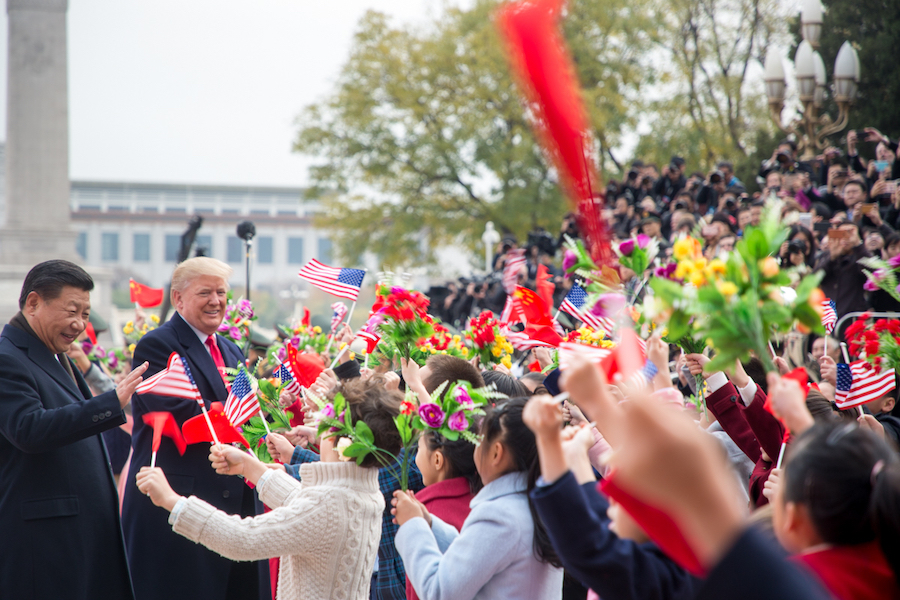Students often describe him as “arrogant,” a quick, hesitant mention before they drop the topic. These oblique references to politics are surprisingly common in the Chinese university classroom, where for five years I’ve taught courses on literature, writing, and international politics.
But for an American teacher at a Chinese university, Donald Trump’s shadow hangs heavier with every passing news cycle. The students are unfailingly polite, yet their mentions of the trade war, Huawei’s expulsion from US markets, and TikTok’s impending buyout all hint at darkening attitudes towards the nation whose reputation, unfortunately, precedes me.
Trump as ‘Imperial Legacy’
When Trump isn’t a “bully,” he’s dismissed as a joke. However, I often get the sense that he represents an arrogance larger than any one individual, no matter how powerful or dangerous. Instead, Trump’s egotism is the legacy of the imperial West, intent on prolonging China’s “century of humiliation” and bullishly clinging to its place in the world.
https://twitter.com/realDonaldTrump/status/1266014911127306240
Attitudes towards America have always been polarized in China, where wariness of the country’s imperial history exists simultaneously with a hunger for Apple phones and the newest Hollywood films.
But Trump’s presidency may have tipped that balance beyond repair, towards an image of America defined by its narcissism, social unrest, and whatever dumb thing Trump happens to say each week.
Unfair Trade and Discrimination
China’s news networks run wild with reports of Trump’s latest tweets, followed, days or months later, by students referencing the country’s “hurt feelings.”
Huawei’s expulsion, in particular, seemed to inspire a deeply personal sense of indignity. “It just isn’t right,” many students said, plastering Trump’s face in the midst of a scathing presentation on trade abuses. “He’s not playing fair; he’s discriminating against the Chinese people.”
These comments seem increasingly justified in light of Trump’s campaigns against Wechat, Tiktok, the Houston Chinese Consulate, and even the near expulsion of overseas students from American universities. Trump’s dubious “security concerns” increasingly draw the reliability of American media and its institutions into question.
A particularly bold essay once argued that America’s internal propaganda was so effective it had effectively constructed its own “patriotic firewall.” In China, many see Trump’s claims as outright lies, and it’s assumed the vast majority of Americans believe them.
Flaws of Democracy vs. Superior Chinese System
More and more, I’ve seen arguments that present Trump’s election as the ultimate chink in democracy’s armor. Five years ago, students filled their papers with oblique references to the benefits of representative government.
These have almost completely disappeared. Instead, the majority now emphasize the stability of the Chinese system, its dependability, its ability to mobilize, and plan ahead.
Mentions of Trump often hint at a skepticism towards Western institutions and their hypocritical failure to uphold human rights — ideas which, more and more, are presented as the outdated dreams of a vanished era.
A few have interpreted Trump’s scandalous behavior and dubious moral character as an indication that democracy simply doesn’t work. Repeated proclamations by the Chinese media that Trump’s handling of COVID-19 “shows the superiority of the Chinese system” begin to seem more and more justified.

For years, students who imagined every American was Christian have apologized to me before making a comment about religion. These days, they do the same thing when they discuss Trump. My students’ imagination may be one of the last places where America remains a united front, an idiot behemoth of a nation whose population actually agrees with what its president says.
Recently, I was surprised to find this idea taken quite seriously in a series of Ph.D. theses on “national reputation,” one of which relied exclusively on official statements from the White House to evaluate the attitudes of the American people.
As unrealistic as this picture might be, it’s the one I’ve encountered most often. From the outside, Trump’s America increasingly resembles the monster many have accused it of being: a sinking ship still drunk on dreams of its own importance, with a maniacal child as captain.
Can Relations with America Be Mended?
Today, with Trump still contesting an election he claims has been stolen from him, I can’t help but wonder how Joe Biden’s presidency will affect attitudes overseas.
Barack Obama remains unfailingly popular. He’s often mentioned peripherally as the representative of America’s old “happy days” with China, and Biden’s victory has been greeted with surprising enthusiasm by the Chinese media.
But it’s easy to feel that too much damage has already been done. Increasingly, amid the chaos of the first presidential debate and protesters filling our streets, America seems like a country with nothing useful to contribute to the rest of the world.
Some have argued that Trump receives too much blame for this, that America’s decline has deeper roots in national hypocrisy and failure to live up to our own values. But on the other side of the planet, having a likable figurehead may be all that matters. Or at least, one who’s a little more careful with his Twitter feed.
DISCLAIMER! The views and opinions expressed here are those of the author and do not necessarily reflect the editorial position of The College Post.
This op-ed originally appeared in The Globe Post.



